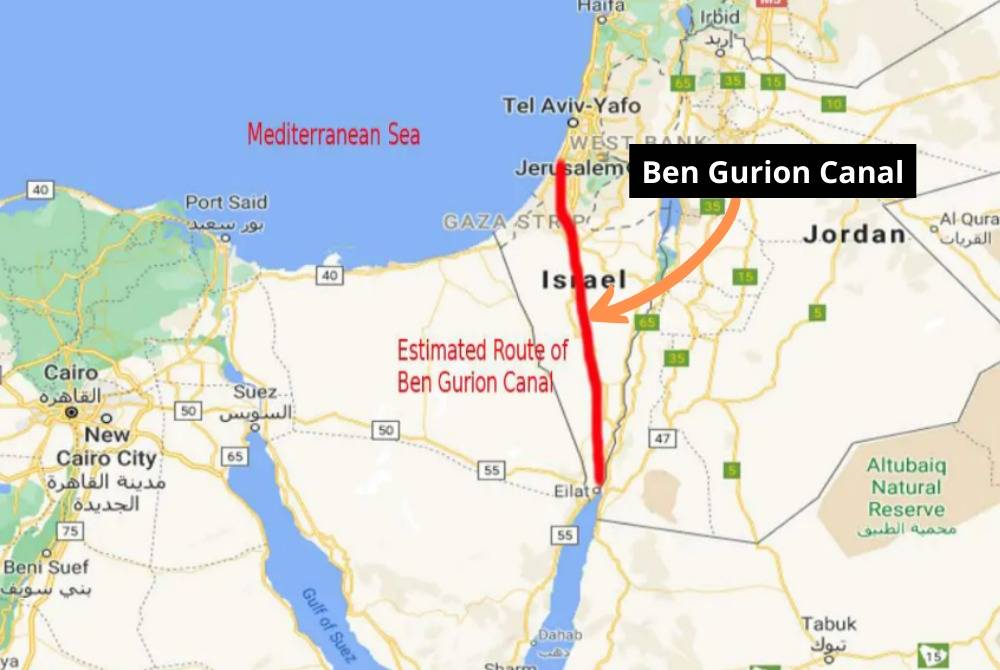Israel's Ben Gurion canal plan and its relation to Gaza

AS Israel continues its assault on the constrained Gaza Strip, discussions about the long-discussed Ben Gurion Canal Project have emerged online.
The project named after Israel's founding father, David Ben-Gurion was conceived in the late 1960s, sought to create an alternative route to the Suez Canal, the primary shipping route connecting Europe and Asia.
While Israel continues to reject demands for a cease-fire and its military campaign in Gaza shows no signs of abating, it is critical to investigate the historical backdrop of the Ben Gurion Canal Project, its intended significance, and the convoluted geopolitics surrounding the Suez Canal.
Understanding the rationale behind the plan necessitates a study of the Suez Canal's convoluted history, the Tripartite Aggression of 1956, and the unforeseen shocks to global trade caused by its closures.
This backdrop highlights the possible geopolitical implications of an alternate canal controlled by Israel given the region's ever-changing dynamics.
WHO IS BEN GURION?
David Ben-Gurion (1886–1973) was a prominent Zionist leader from Poland, who was known as the founding father of Israel.
He was described as a ruthless man who gave orders to Zionist militias to see the mass explosion of Palestinians from their lands and facilitated the influx of Jewish immigrants from all over the world into Palestine. He served as the first prime minister of Israel in 1948.
WHAT IS BEN GURION CANAL PROJECT?
In the 1960s, Israel proposed the Ben Gurion Canal project, which would have connected the Mediterranean Sea to the Red Sea by way of the southern end of the Gulf of Aqaba.
In order to get between the Negev (Naqab) Mountains and the Jordanian Highlands, the route was designed to pass through the port city of Eilat and the Jordanian border. It then swerved west before the Dead Sea basin and travelled through a valley in the Negev Mountain (Naqab) Range. Once more heading north, it would pass through the Gaza Strip and into the Mediterranean Sea.
However, a connection between the Red Sea and the Mediterranean Sea already exists through the Suez Canal - an artificial sea-level waterway in Egypt that offers vessels a direct route between the North Atlantic and the northern Indian oceans, reducing journey distance and time.
The Suez Canal provides the shortest sea route between Asia and Europe and currently handles roughly 12 percent of the world's trade.
WHY WAS THE PROJECT PROPOSED BY ISRAEL?
The freedom of passage across the Suez Canal was previously guaranteed to all ships throughout times of war and peace by the Constantinople International Convention, which was signed in 1888 by the major European nations of the day.
But following the creation of Israel in 1948 and the horrific expulsion of Palestinians, widely known as the Nakba, Egypt shut off access to the Suez Canal multiple times until then-Egyptian President Gamal Abdel Nasser nationalised it in 1956.
Egypt blocked Israeli vessels from accessing the canal from 1948 until 1950, affecting its ability to trade with East Africa and Asia, and hampering its ability to import oil from the Gulf region.
Access to the Suez Canal was closed to all international shipping in 1956, following the Tripartite Aggression against Egypt, which involved an alliance between Israel, the UK and France who sought to regain control of the Suez Canal and remove Nasser from power.
During the conflict the canal was effectively closed, and the situation worsened, leading to a crisis with global and economic repercussions.
In 1967, at the start of the Six-Day War, also known as the Arab-Israeli War, which was fought between Israel and a coalition of Arab states (namely Egypt, Syria, and Jordan), the Suez Canal was likewise blocked for eight years.
Israel's ability to trade with East Africa and Asia was severely hindered when Arab powers closed all land trade routes, mostly for the purpose of importing oil from the Persian Gulf.
Additionally, the canal's closure caused a huge and unanticipated shock to international trade and economy.
An alternative to the Suez Canal, especially one under the authority of key Western ally Israel, would eliminate the potential use of the Suez Canal and the Straits of Tiran as leverage by Egypt against Israel or its allies.
ECONOMIC GAINS
Egypt's economy has advanced significantly thanks in large part to the Suez Canal. Tolls and transit fees received by ships passing through the canal provide income for it.
About 20,649 vessels passed through the Suez Canal in 2021, a 10% increase from 2020. The transit fees generated $8 billion in income annually in 2022. With an annual revenue of $9.4 billion for the fiscal year that concluded on June 30, 2023, the Suez Canal broke previous records.
The canal is the focal point of Egypt's economy, drawing foreign capital and fostering the growth of industries and services, but its major utility is still its ability to promote trade between nations, creating an effective worldwide trade route.
If built, the Ben Gurion Canal would be a serious financial threat to Egypt and compete with the Suez Canal.
If construction proceeds, it will surpass the existing 193.3 km Suez Canal by about one-third, and the person in charge of it would wield immense power over the world's supply channels for grain, commerce, and oil.
WHY GAZA MATTERS
In order to assist in building the canal, the United States had previously suggested using about 520 nuclear bombs on the Negev Desert (Naqab). Alleged plans exist to literally cut costs and minimise expenses by rerouting the canal through the centre of the Palestinian enclave, now that Gaza has been destroyed.
The Palestinians' presence there would still be a barrier, though.
The route of the proposed canal passes close to the northern border of Gaza, the besieged enclave that was home to more than two million people before the latest conflagration started.
Some believe Israel might even change course to cut it right through Gaza. A damning report in Israeli media has deepened suspicion that the Netanyahu government didn't act on intelligence warnings about the Oct 7 event, but is using it as a pretext to launch its 'clear-Gaza campaign'.
Israel has been pounding northern Gaza nonstop since it began its campaign on the embattled enclave, forcing Palestinians to flee south before launching a ground invasion several weeks later. The Palestinian Central Bureau of numbers (PCBS) has released numbers indicating that at least 400,000 Palestinians have been forced to relocate from the north to the south.
800,000 Palestinians still live in what was referred to as the "north," which was the region north of Wadi Gaza. At least 11,470 people have died in Gaza as a result of Israel's indiscriminate bombing assault, which has largely targeted the north and mostly killed civilians, including women and children.
Due to Israel's bombing of Al-Shifa, the main hospital in Gaza and a hub for gathering information on fatalities and the injured, it has been difficult to ascertain a correct figure for the death toll.
Israel has demanded the "voluntary migration" of Palestinians from Gaza amid claims that it was ethnically cleansing the territory.
Download Sinar Daily application.Click Here!















